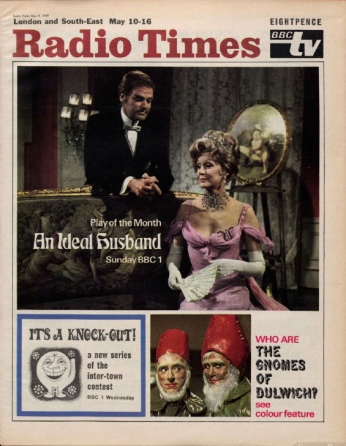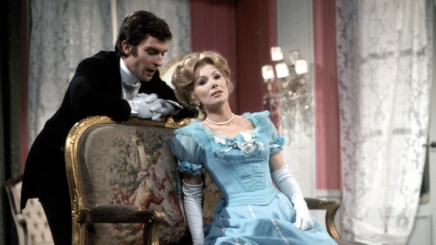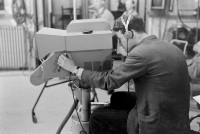 This Thursday, 1 May, sees the start of our new season of BFI Southbank screenings, Classics on TV: Edwardian Drama on the Small Screen (the link takes you to full details). We begin with a tremendous double bill of Oscar Wilde’s An Ideal Husband in a sumptuous 1969 version directed by Rudolph Cartier together with a – dare I say unmissable – rarity from 1960: a BBC schools production of J. M. Synge’s Riders to the Sea with Sybil Thorndike and Sean Connery. (There are still some tickets available; go here to book.) My colleague Amanda Wrigley is composing a post about Synge’s one-act poetic drama; this contribution is simply an introduction to the Wilde.
This Thursday, 1 May, sees the start of our new season of BFI Southbank screenings, Classics on TV: Edwardian Drama on the Small Screen (the link takes you to full details). We begin with a tremendous double bill of Oscar Wilde’s An Ideal Husband in a sumptuous 1969 version directed by Rudolph Cartier together with a – dare I say unmissable – rarity from 1960: a BBC schools production of J. M. Synge’s Riders to the Sea with Sybil Thorndike and Sean Connery. (There are still some tickets available; go here to book.) My colleague Amanda Wrigley is composing a post about Synge’s one-act poetic drama; this contribution is simply an introduction to the Wilde.
You might also be interested to note that An Ideal Husband is the focus of two papers at our half-day Screen Plays symposium on Friday 23 May. This free event at BFI Southbank will explore some of the issues raised by the season. We are delighted that in ‘An Ideal Husband – a realistic marriage? Wilde, feminism and Britain’, Dr Michelle Paull, Senior Lecturer in Drama at St Mary’s University, London, will discuss the production in terms of its cultural and sociopolitical context in 1969, reflecting on this modern engagement with the ‘New Woman’ of this period. Complementing this paper, Dr Leah Panos, Postdoctoral Researcher on the Spaces of Television: Production, Site and Style project at the University of Reading, will speak on ‘Colour, Cartier and An Ideal Husband‘, examining this production as one of the earliest major dramas from the BBC in colour and discussing Cartier’s early commitment to colour television.
The play in 1895
Oscar Wilde’s play, which takes place across a single evening and the following day, is a society drama in which a prominent politician, Sir Robert Chiltern, is threatened with blackmail by a beautiful woman with a past, Mrs Cheveley. Mrs Cheveley threatens to reveal a secret from Chiltern’s youth, when he made a serious error of judgement, unless Chiltern speaks in the House of Commons in favour of an investment scheme that he knows to be fraudulent.
The play opened in London at the Haymarket Theatre on 3 January 1895, and quickly became a huge hit. In his Saturday Review notice George Bernard Shaw wrote, ‘In a certain sense Mr Wilde is to me our only thorough playwright. He plays with everything: with wit, with philosophy, with drama, with actors and audience, with the whole theatre.’ (quoted in Michael Holroyd, Bernard Shaw, London: Vintage, 1998, p. 593) Wilde’s even more successful The Importance of Being Earnest premiered just six weeks later on 14 February.
In April, however, Wilde was arrested for ‘gross indecency’ and his name was taken off An Ideal Husband. There was a short transfer to the Criterion Theatre but by the end of the month the play had closed. As a consequence of these events, the play is often seen as having strong autobiographical concerns, with its themes of society’s attitudes to past sins, the dangers of blackmail and the importance of forgiveness. At the same time, it is a fascinating drama about the relations between the sexes and of attitudes towards the aristocracy.
Peter Raby has written of the play:
Wilde worked within the theatre conventions of his time, and with the world he knew, even if he did not belong to it. He saw it as a fantastic masquerade, highlighting aspects of English public life which themselves inhabited the dimension of theatre: the smart dance, the country house party, the Chilterns’s reception. […] In An Ideal Husband, the idea of ‘real’ life as theatre is especially powerful, with Chiltern’s off-stage ‘performance’ in the House of Commons glowingly reviewed in The Times the following day. […] Morality, public and private, is brought into question […], and found wanting quite as radically as in the ‘stronger’ dramas of Ibsen. (‘Wilde’s comedies of Society’, in Peter Raby, ed. The Cambridge Companion to Oscar Wilde, Cambridge University Press, 1997, pp. 157-158)
The production in 1969
Producer Hal Burton mounted a BBC television production of An Ideal Husband in December 1958 (now lost), and there was an opulent feature film version directed by Alexander Korda in 1947, with Paulette Goddard as Mrs Cheveley and lavish gowns by Cecil Beaton. The opportunity for visual excess was similarly embraced by director Rudolph Cartier when he came to mount the play in the studio for producer Cedric Messina and the Play of the Month strand in early 1969. The recording was made in colour, which today looks spectacular, even though BBC1, on which the production was first broadcast on 11 May 1969, did not start regular colour broadcasts until November that year.
As with many of Messina’s productions, the casting is impeccable. Mrs Cheveley is given calm, calculation and a certain grandeur before her inevitable fall by Margaret Leighton, who was successfully negotiating a career on the stage and in feature films on both sides of the Atlantic. Jeremy Brett’s is the other stand-out performance, in the second-lead role of Viscount Goring, faithful friend to Chiltern and the architect of Mrs Cheveley’s defeat, for which he is rewarded with hand of Chiltern’s sister Mabel, played by Susan Hampshire.
In the Guardian, Stanley Reynolds was ambivalent in his response to the production:
It was perhaps not much of an intellectual choice for a Play of the Month, but it was not much more melodramatic than a lot of highly regarded modern television. One could compare it, say, The Troubleshooters or The Power Game, two highly melodramatic series which are always curiously being praised for their realism. (‘Weekend television’, The Guardian, 12 May 1969, p. 6)
By far the most substantive engagement with the production to date is that by Dr Billy Smart in his (as yet unpublished) thesis, ‘Old Wine in New Bottles – Adaptation of Classic Theatrical Plays on BBC Television 1957-1985’ (Royal Holloway College, 2010). (Billy is a contributor to this blog and a much-valued friend of Screen Plays, and he is giving the keynote lecture to our symposium on 23 May.) His detailed discussion compares Rudolph Cartier’s deployment of multiple cameras within the studio with the approach of Messina as director in the later Play of the Month: Pygmalion (1973):
Cartier’s directorial technique demonstrates a greater awareness of the possibilities of studio technique to comment upon the action of a play, and I present it here as an exemplary production in its use of finely realised period detail to achieve dramatic effects, as an interpretation that works on deeper levels than the surface aesthetic visual pleasure of Messina’s production. Cartier’s directorial approach is manifested through a great degree of forethought given to the implications of space and the positioning of performers. (p. 142)
An Ideal Husband deploys a unified colour scheme with a sense of detail and boldness rarely subsequently attempted in television drama. Each separate space has a décor of a specific colour, which signifies a particular emotional state and the differing degree to which action occurs in public or private. […] Throughout the play, the colours used are of much bolder and more striking hues thanthe watercolour shades of comparable 1980s BBC productions of Wilde (Lady Windermere’s Fan, 1985, The Importance of Being Earnest, 1988, both for Theatre Night, BBC2). (pp. 147-148)
Billy Smart also comments on the production’s notable changes to Wilde’s text. For the most part, the television version is faithful to the stage version, although an element from the start of Act III with Lord Goring and his butler is transposed to provide a striking opening for the television version. Act IV, however, is substantially shortened, and for reasons – apart from a reduction in running time – that are not apparent. The most crucial cut is the offer of a place in the cabinet for Sir Robert. Instead Chiltern and his wife jointly decide that he should retire from public life. As Smart reflects:
In the original text Sir Robert and Lady Chiltern briefly discuss the nature of love and duty once Lord Goring and Mabel have left the room, then kiss. In the Play of the Month version, a butler appears to announce that “Luncheon is on the table, milady!” and the reconciled and newly engaged couples leave the room together arm in arm, creating an impression of resolution and harmony similar to that found at the end of a Shakespeare comedy. The effect of this alteration on the complexity of Wilde’s play would be akin to a production of [Ibsen’s] A Doll’s House that concluded with the relief of the threat of exposure to Torvald and cut the subsequent dialectical discussion between husband and wife about the nature of marriage. (pp. 149-150)


Discussion
Trackbacks/Pingbacks
Pingback: Two Edwardian dramas: 1 ‘Play of the Month: An Ideal Husband’ (BBC1, 11 May 1969) | Forgotten Television Drama - 15 January 2016